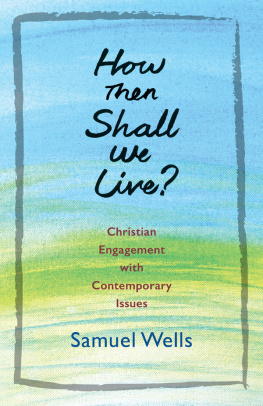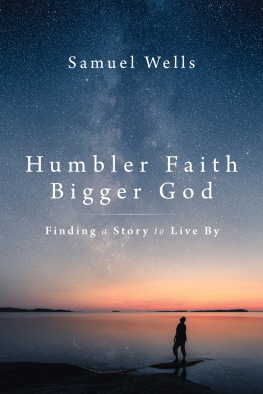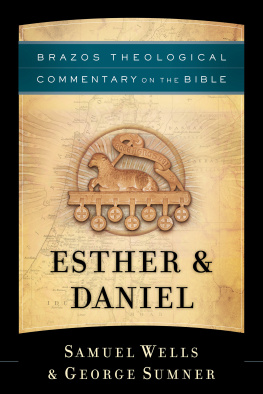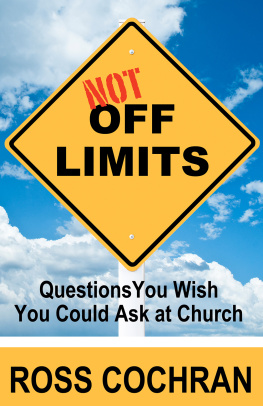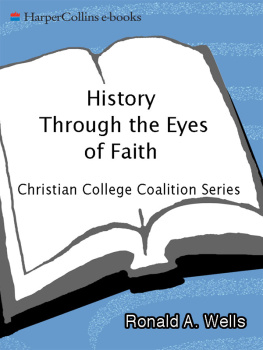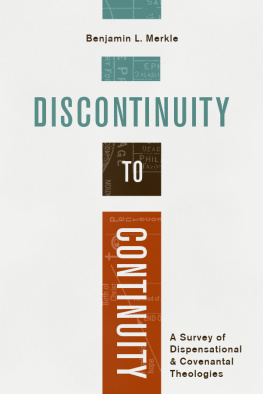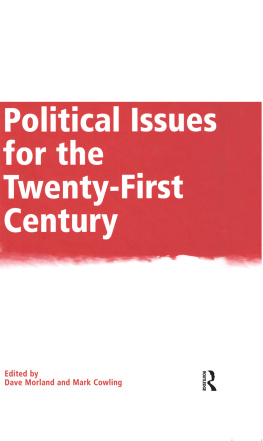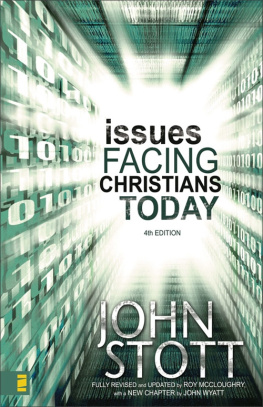How Then Shall We Live?
Christian Engagement with
Contemporary Issues
Samuel Wells

Copyright 2016, 2017 by Samuel Wells
All rights reserved. No part of this book may be reproduced, stored in a retrieval system, or transmitted in any form or by any means, electronic or mechanical, including photocopying, recording, or otherwise, without the written permission of the publisher.
Unless otherwise noted, the Scripture quotations contained herein are from the New Revised Standard Version Bible, copyright 1989 by the Division of Christian Education of the National Council of Churches of Christ in the U.S.A. Used by permission. All rights reserved.
First published in 2016 in the United Kingdom by the
Canterbury Press Norwich Editorial office
3rd Floor, Invicta House,
108114 Golden Lane,
London EC1Y 0TG
First published in the United States in 2017 by Church Publishing
19 East 34th Street
New York, NY 10016
www.churchpublishing.org
Cover design by Jennifer Glosser, 2Pug Design
Typeset by Denise Hoff
Library of Congress Cataloging-in-Publication Data
Names: Wells, Samuel, 1965- author.
Title: How then shall we live? : Christian engagement with contemporary issues / Samuel Wells.
Description: New York : Church Publishing, 2017.
Identifiers: LCCN 2017012466 (print) | LCCN 2017027000 (ebook) | ISBN 9780898690019 (ebook) | ISBN 9780898692549 (pbk.)
Subjects: LCSH: Christianity and culture.
Classification: LCC BR115.C8 (ebook) | LCC BR115.C8 W434 2017 (print) | DDC 261--dc23
LC record available at https://lccn.loc.gov/2017012466
For Chad Boulton OSB
Without a great deal of forward planning I seem to have become a pastor, theologian, preacher, author, institutional leader and broadcaster. This book is a place where those six identities meet. It discusses around 25 issues on which I believe the church should have a viewa view that doesnt simply say, Things should be how they used to be, The government should do more, or We should get back to what the Bible really says. Rather than wait for the church to speak on such issues, I thought it might show more initiative to offer my own two cents.
Im grateful to a good many friends whove corrected my false assumptions and stimulated my reflections in writing these short pieces. Among them are Anna Rowlands, Ellen Davis, Michael Goldman, Luke Bretherton, Robert Pfeiffer, Stanley Hauerwas, Fiona MacMillan, Ali Lyon, Jerome Berryman, John Kiess, Ana Kiess, Jo Bailey Wells, Caroline Worsfold, Mindy Makant, Rebekah Eklund, Clare Herbert, Charis Geoghegan, David Warbrick, John Inge, and David Trelawny-Ross. Im grateful also for my ministerial and musical colleagues Richard Carter, Katherine Hedderly, Jonathan Evens, Will Morris, Alastair McKay, Andrew Earis, and Tom Williams for creating the pastoral and liturgical context in which many of these reflections came to light.
The reflection entitled Retirement appeared in largely similar form as Time to Go: Ascension, in The Bright Field: Meditations and Reflections for Ordinary Time, edited by Martyn Percy (Norwich: Canterbury 2014, 190-94). A much shorter version of the reflection entitled Bereavement appeared entitled All Souls in the same volume (238-40).
One night in Dakar, 25 years ago, I had an argument with a friend. It was, I think, the best argument I ever had; not because I won it (probably still disputed), or because it was lucid or articulate (it was neither), but because, looking back, Im glad we both cared so much to fight so loud and long. It was, on the surface, about faith, and preaching, and when not to say what you were really thinking. But over four hours into the night in a sweaty Senegalese hostel, it was of course about more than that. It was about two young men sparring with each other like two lion cubs. And it was about two lives that were being tugged in different directions. Mine became the sentence that began this preface. His emerged into the calling of a Benedictine monk. In many ways were still having the same argument. I suspect we always shall. This book is dedicated to him, in trust that friendship is the closest we get to finding out what the heart of God is made of.
Youre at your brothers. Youre in the kitchen. Everyone else is out somewhere. The house is quiet. Youre sitting together at the table, each holding a cup of coffee. Your brother has offered you cookies, cake, sugaranything to keep the faade of hospitality going and delay the conversation you know is coming. In the end you put your hand on his shoulder, just for a moment, as you dont really do tenderness, and you say, as gently and patiently as you can, What is it?
You can see hes fighting his emotions, not used to being so intimate with you. He cant open his mouth lest words give way to convulsive sobs and bellows of distress. So he holds a fist to his cheek, until hes steady enough to let a handful of words slip out. I just keep asking myself, why? And suddenly you can see it all. Everything hes been struggling with these last ten years. Waves of anger, when you know to keep out of his way. Strains of guilt, when he wonders if he somehow brought it all on himself. Struggles for faith, when he cant find any purpose in the course of events. Depression that induces him to lose all sense of meaning in anything. And a creeping paralysis, a feeling of powerlessness in which he sees himself as victim with no ability to make a plan or pull himself together.
Theres nothing you can say. All you can tell him is, Im here. Im with you. This will end. And even if it doesnt, Im not going away. Inside youre desperately scratching around for words of consolation. And then, searching the ceiling for hope, your eyes settle curiously on a pile of papers on top of the kitchen sideboard. You ask, not wanting to change the subject, but needing to know, What are those papers? Your brother, glad of the lightening of the mood and the momentary shift of attention away from his troubles, replies, I think its some kind of manuscript for a book. Ive never got around to reading it. Its all in old-fashioned handwriting. You climb on a stool and fetch down the papers. And together you begin to make out a storya story about your ancestors.
Youre mesmerized. This ancient story puts your brothers misery in perspective. But its not just that: the two narratives have a lot of similar features. This old manuscript tells of a family that thought theyd escaped from persecution, and believed they were on their way to freedom, but got waylaid. They felt just the kinds of things your brother was feeling. They felt angry, and guilty. They asked, Why? They got terribly depressed. They were full of doubts. They had the same creeping paralysis and powerlessness. A lot of the manuscript wasnt about the oppression theyd left behind or the freedom they were looking forward toit was about the conversations they had and the discoveries they made when they got waylaid.
And then you have an idea. You say, Why dont we spend the next month or two turning this manuscript into a book? It seems to be three or four different stories, but we can try to weave it into one narrative. Ive got a gut feeling that if you find a way to sort out this story, our ancient story, you might find the key to sorting out your own story.
What Ive been describing is how the Bible came to be written. Israel was in Babylon, in exile, captured and deported by the Chaldeans, dragged a thousand miles due east. It was angry, guilty, depressed, despairing, doubtful, paralyzed, powerless. Just like your brother in the kitchen. And what Israel did, like your brother with the manuscript, was to piece together the half-remembered stories of its people from a thousand years before, stories of slavery, escape, and freedom. But most crucial of all were the stories at the heart of the narrative, stories of the time in the wilderness, when slavery was a memory but true freedom was still out of reach. These stories were crucial because thats how Israel was feeling in a new wilderness called Babylon, in a desolate season called exile. We recognize the feeling: its like refugees whove escaped the theatre of war but not found a place to call home. The exiles in Babylon wrote down their peoples wilderness history, because it had important lessons for their own present and future. Like your brother in the kitchen, they said Why? But behind the why was a mixture of grief, bewilderment, and an urgent need to make a plan. What emerged was the bedrock of what today we call the Old Testament.

